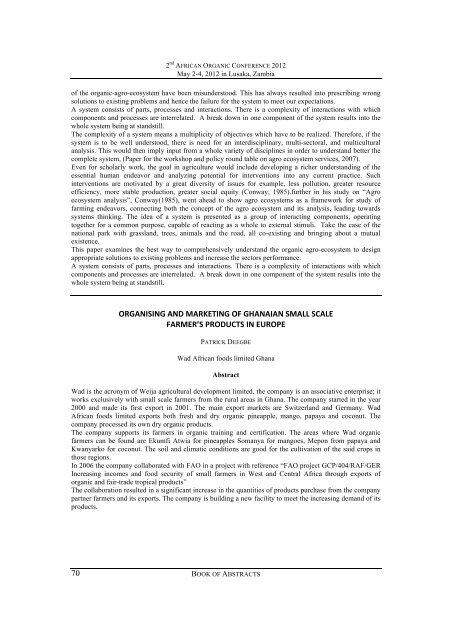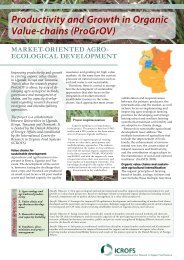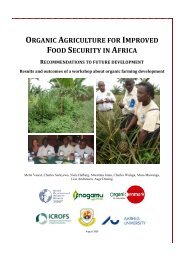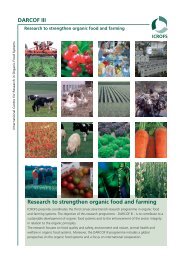The 2nd African Organic Conference â Mainstreaming ... - ICROFS
The 2nd African Organic Conference â Mainstreaming ... - ICROFS
The 2nd African Organic Conference â Mainstreaming ... - ICROFS
Create successful ePaper yourself
Turn your PDF publications into a flip-book with our unique Google optimized e-Paper software.
2 nd AFRICAN ORGANIC CONFERENCE 2012<br />
May 2-4, 2012 in Lusaka, Zambia<br />
of the organic-agro-ecosystem have been misunderstood. This has always resulted into prescribing wrong<br />
solutions to existing problems and hence the failure for the system to meet our expectations.<br />
A system consists of parts, processes and interactions. <strong>The</strong>re is a complexity of interactions with which<br />
components and processes are interrelated. A break down in one component of the system results into the<br />
whole system being at standstill.<br />
<strong>The</strong> complexity of a system means a multiplicity of objectives which have to be realized. <strong>The</strong>refore, if the<br />
system is to be well understood, there is need for an interdisciplinary, multi-sectoral, and multicultural<br />
analysis. This would then imply input from a whole variety of disciplines in order to understand better the<br />
complete system, (Paper for the workshop and policy round table on agro ecosystem services, 2007).<br />
Even for scholarly work, the goal in agriculture would include developing a richer understanding of the<br />
essential human endeavor and analyzing potential for interventions into any current practice. Such<br />
interventions are motivated by a great diversity of issues for example, less pollution, greater resource<br />
efficiency, more stable production, greater social equity (Conway, 1985).further in his study on “Agro<br />
ecosystem analysis”, Conway(1985), went ahead to show agro ecosystems as a framework for study of<br />
farming endeavors, connecting both the concept of the agro ecosystem and its analysis, leading towards<br />
systems thinking. <strong>The</strong> idea of a system is presented as a group of interacting components, operating<br />
together for a common purpose, capable of reacting as a whole to external stimuli. Take the case of the<br />
national park with grassland, trees, animals and the road, all co-existing and bringing about a mutual<br />
existence.<br />
This paper examines the best way to comprehensively understand the organic agro-ecosystem to design<br />
appropriate solutions to existing problems and increase the sectors performance.<br />
A system consists of parts, processes and interactions. <strong>The</strong>re is a complexity of interactions with which<br />
components and processes are interrelated. A break down in one component of the system results into the<br />
whole system being at standstill.<br />
ORGANISING&AND&MARKETING&OF&GHANAIAN&SMALL&SCALE&&<br />
FARMER’S&PRODUCTS&IN&EUROPE&<br />
PATRICK DEEGBE<br />
Wad <strong>African</strong> foods limited Ghana<br />
Abstract<br />
Wad is the acronym of Weija agricultural development limited, the company is an associative enterprise; it<br />
works exclusively with small scale farmers from the rural areas in Ghana. <strong>The</strong> company started in the year<br />
2000 and made its first export in 2001. <strong>The</strong> main export markets are Switzerland and Germany. Wad<br />
<strong>African</strong> foods limited exports both fresh and dry organic pineapple, mango, papaya and coconut. <strong>The</strong><br />
company processed its own dry organic products.<br />
<strong>The</strong> company supports its farmers in organic training and certification. <strong>The</strong> areas where Wad organic<br />
farmers can be found are Ekumfi Atwia for pineapples Somanya for mangoes, Mepon from papaya and<br />
Kwanyarko for coconut. <strong>The</strong> soil and climatic conditions are good for the cultivation of the said crops in<br />
those regions.<br />
In 2006 the company collaborated with FAO in a project with reference “FAO project GCP/404/RAF/GER<br />
Increasing incomes and food security of small farmers in West and Central Africa through exports of<br />
organic and fair-trade tropical products”<br />
<strong>The</strong> collaboration resulted in a significant increase in the quantities of products purchase from the company<br />
partner farmers and its exports. <strong>The</strong> company is building a new facility to meet the increasing demand of its<br />
products.<br />
70<br />
BOOK OF ABSTRACTS





